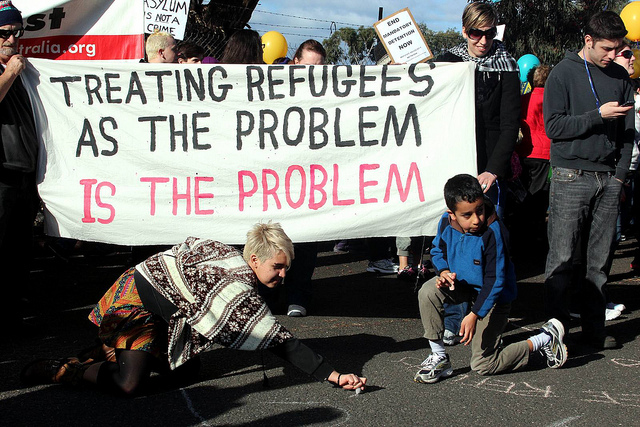
CANBERRA (Radio New Zealand International / Pacific Media Watch / International Business Times): A large group of prominent Australians says the government must end its "damaging" policy of shipping asylum seekers off to deportation camps in Papua New Guinea and Nauru.
The group includes those prominent in academia, the arts, medicine and the law, including human rights lawyer Julian Burnside and novelist Dr Rosie Scott.
They have all signed a letter to the Australian government. The letter follows revelations by Dr Peter Young, the former chief psychiatrist monitoring asylum seekers in Australia's deportation centres, had prompted the letter. Dr Young had accused the government of "deliberately inflicting harm" on vulnerable people in a manner akin to torture.
The letter also accuses the Australian federal government of "tolerating and/or encouraging racist media coverage" of asylum seekers.
It points out that people who arrive by boat are not in fact illegal, as "in truth they have broken no law by coming to Australia and seeking asylum".
Radio New Zealand International interviewed a signatory and developmental psychiatrist, Monash University professor Louise Newman, about the letter:
"This is really an attempt to bring together many people who have been raising issues of concern about the current situation with Australia's treatment of asylum seekers. As you're aware, there's been issues raised recently about the provision of health, and mental health services, very damning revelations about the treatment of children, issues about the actual operationalisation of Australia's so-called border protection policies with the government seemingly happy to have people languishing in the ocean for over a month.
"I think what we have in this country at the moment is really a growing level of concern about what we are doing. And what we are hoping to achieve by bringing these groups together and some fairly prominent individuals have been involved in the issues for some time is to really say in a clear way what our concerns are and the fact that it is on many levels not acceptable to many people in the community.
"Unfortunately in Australia at the moment we have very much a government position on focussed on what they would see as deterrence of asylum seekers, very difficult to have discussions either in general media or with government around some of the more complex issues and let alone the moral and ethical issues that this sort of policy raises.
"So the j'accuse statement, of course, is built on a very long tradition of people working in a social justice area who really want to say to government that we do know that you are aware of the damage and harm that's being done to people and you do this consciously. And that there's an attempt to manipulate or influence the Australian community into somehow thinking that this frankly immoral maltreatment of people is acceptable."
Meanwhile, the Sydney Morning Herald reported yesterday that sick asylum seekers on Christmas Island were going to be treated by videoconference.
"Fairfax Media understands at least one young woman on Christmas Island, who has been complaining of stomach aches for four months, was told this week that she would be seeing a specialist via videolink and the appointment would happen immediately."
But Dr Richard Kidd of the Australian Medical Association said videoconference consulations could not replace face-to-face consultations.
‘‘I would be really anxious at this stage that it’s not just some tokenistic thing that isn’t done properly,’’ Dr Kidd told the Sydney Morning Herald.
The newspaper also reported that Australia could sign a deal this week with the Cambodian government, allowing Australia to send 1000 refugees to live in the poverty stricken Cambodia.
It quoted academic Joyce Chia in saying the deal was flawed and that it would be much cheaper for the Australian people for the refugees to be resettled in Australia.
“Cambodia is a poor country, a developing country, with no history of resettling refugees, or established capacity for that. This is not a long-term solution,” Dr Chia told the newspaper.
This work is licensed under a Creative Commons Attribution-NonCommercial 3.0 New Zealand Licence.




